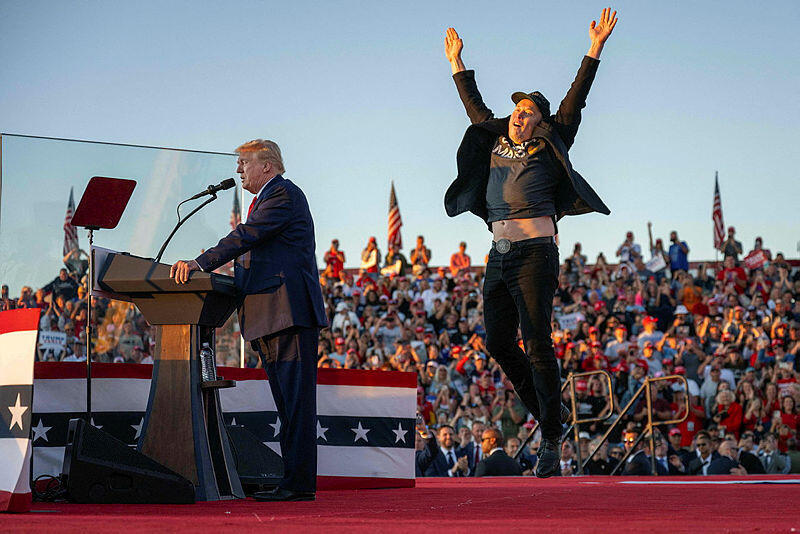Israeli social media networks were in an uproar earlier this week after the discovery that Iran's Supreme Leader Ali Khamenei opened an official account in the Hebrew language on the X platform. The many reports said after a day that the account had been removed, but a check by Ynet revealed that the joy was apparently premature, because the account is still available on Elon Musk's social media network.
It is unclear whether the account was removed and then restored or was never removed. In any case, it still only has two tweets, the first from four days ago and the second from three days ago. Although the Iranian government and its friends also have official accounts on X or Tiktok, these are intended for official communication with Iranians in the country or around the world. Khamenei's account in Hebrew, on the other hand, includes for the time being only a threat to Israel and its inhabitants.
Attorney Guy Ofir, who revealed the fact that the account was apparently restored (or, as mentioned, was not removed at all in the first place), said that X's willingness to host the account "borders on supporting terrorism, since Iran has been defined by the U.S. a state sponsor of terrorism since 1984."
Much has already been said about the fact that social networks do not enforce their regulations in an equal or logical way. In fact, it was Elon Musk who recently said out loud that X would be used to promote the campaign of his favorite candidate for U.S. president, Donald Trump. In the U.S., there have already been many claims that the platform removes more posts that oppose Trump than those that support him
Another example can be found in the messaging platform Telegram, whose owner and founder Pavel Durov was arrested and investigated by French authorities for the same issue: lack of enforcement of the distribution of illegal content. Durov was arrested for several days and is now facing a trial that may cause him a lot of damage and may even land him in a French prison.
And the situation is not much better on Tiktok . For example, the platform hosts a channel of the Iranian hacker group Handala, where content was uploaded that the group publishes on Telegram and includes threats to the Israeli networks, including stealing data from Israeli websites it has attacked. As of this writing, it appears that the channel has been blocked and no longer appears on the platform.
At the same time, when it comes to Meta's platforms (Facebook, Instagram, WhatsApp and Threads), the company often blocks content that is defined as too political or that spreads hate or fake news. Although it also publish problematic posts, it really depends on the said platform.
On Facebook, for example, the scope of political content appears to have decreased considerably, after the algorithm apparently was changed by the management. On Instagram and Threads the situation is different, and political activists can be found clashing with each other or supporters of different countries slandering other countries.
A jungle of information and decisions
The neutering of the various content drivers that appear on the platforms raises another difficult problem: While the traditional media such as newspapers, radio or television are covered under various regulations and ethics regulations, on social networks it feels like a jungle where everyone can do what they want.
And at the same time, if the regulations are violated, this usually manifests itself in arbitrary blocking without explanation. The result? Reports on accounts or posts have also become countermeasures. If you want to silence someone, it's enough to report content as inappropriate. If there are enough reports (how many? Not clear) the content will be removed and maybe that person's account will even be suspended.
And there are no shortage of cases where accounts were removed even though there was no real reason to do so, especially among users and network influencers who expressed support for Israel since the beginning of the war. The situation has improved a little, but not by much. The obvious conclusion is that the time has come to bind social networks to the various advertising rules that apply to traditional media.
Of course, this is not a new idea, but as you can see - it is very difficult to see how those companies manage to regulate and monitor themselves in an equal and global way. Each country has its own sensitivities and it is clear that the rules are different everywhere. This is not a new idea, but it is very difficult to see how those companies manage to regulate and monitor themselves in an equal and global way. Each country has its own sensitivities and it is clear that the rules are different everywhere.
"It is the intention of my office and my client (whom I already represent against x), to take all possible legal procedures in Israel in order to bring the platform to close the Hebrew profile of Ali Khamenei whose purpose is to spread terrorism. X's conduct constitutes support for terrorism and the violation of Israeli law that applies to it, certainly when we are dealing with a Hebrew profile and not a Persian profile." according to Ophir.
Regarding the publication of Ali Khamenei's content in Hebrew, Ynet asked X for a response, and although we expected the regular response that the platform usually sends to journalists, this time we didn't even get that. We asked for Tiktok's response regarding the Iranian hacker channel, and nothing was received from them either by press time; will be attached when it is received.
Get the Ynetnews app on your smartphone:



